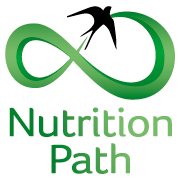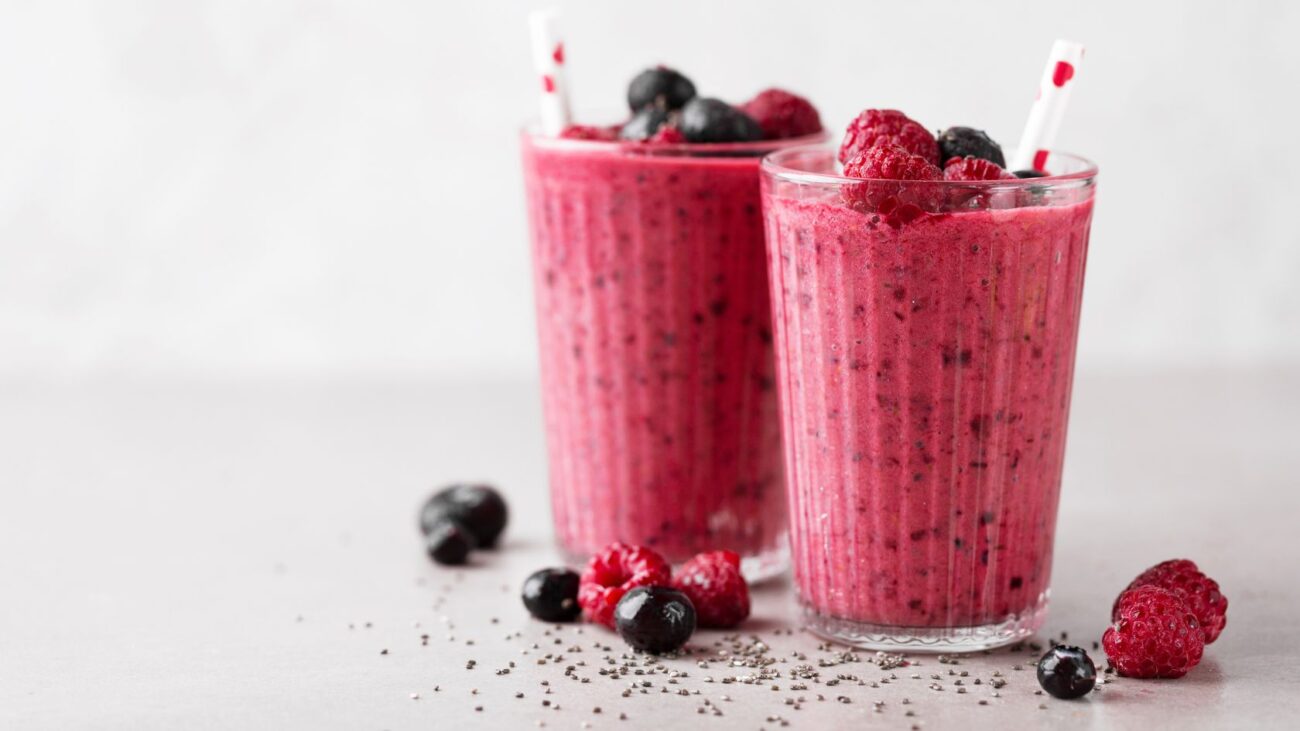Written by Milda, Registered MSc Nutritional Therapist and NCFED-trained practitioner specialising in binge eating, emotional eating and ADHD. With roots in Bath & Bristol, UK , working globally online.
If you live with ADHD you will know that focus, energy and moods can vary hugely from day-to-day and motivation everyday is definitely not guaranteed. While medications and lifestyle changes can be key in ADHD, depending on each individual, nutrition can be a super powerful tool to manage ADHD symptoms.
Nutrition may be one of the most important and the most underused tools for ADHD. Dopamine – often low in ADHD– is made from amino acids dopamine and phenylalanine, found in proteins. B vitamins are cofounders in dopamine synthesis, meaning, without them the process of making dopamine isn’t complete. Additionally, ADHD symptoms can be influenced by a few common nutrient deficiencies, such as zinc, iron and vitamin D.
In this article, we will focus on some of the most important nutrients that help improve ADHD symptoms, including common ADHD nutritional deficiencies.
- Why Nutrition Matters for the ADHD Brain
- Foods that can make ADHD symptoms worse
- Key Nutrients That Support ADHD
- Should I use a supplement of these nutrients for ADHD?
- 1. Protein – supports ADHD energy and helps reduce cravings
- 2. Omega-3 Fatty Acids– promotes focus and brain health
- 3. B Vitamins – energy, mood and stress resilience
- 4. Magnesium– calm for the nervous system
- 5. Zinc – dopamine receptor sensitivity and impulse control
- 6. Iron – dopamine production
- 7. Vitamin D – brain health and mood support
- FAQs About ADHD and Nutrition
Why Nutrition Matters for the ADHD Brain
I have been a practicing nutritional therapist for 9 years and my clinical work is focused on disordered eating, binge eating and, increasingly over the years, neurodivergence and ADHD.
The majority of people that come through my clinic door link nutrition and food with calories and weight, but are often surprised to learn that nutrition is actually an essential step in reducing cravings and improving ADHD symptoms.
ADHD is complex and some one of the key differences in the ADHD brain is HOW dopamine is processed. Dopamine is a neurotransmitter, which is key in motivation, focus and pleasure or sense of reward. When dopamine runs low, signalling between brain cells is less efficient and it can feel like focus and staying on track is harder, motivation is running lower.
A common question I get is “Can diet REALLY affect ADHD symptoms?”. And my clinical experience and knowledge in the field says YES, absolutely. It doesn’t mean that every person will have the same “recipe” for success, but there are common ADHD nutritional deficiencies and other nutrients in foods that can support the ADHD brain.
Foods that can make ADHD symptoms worse
Just as there are foods that can help support and improve ADHD symptoms, there are also foods that can make ADHD symptoms worse. While each individual with ADHD can have different reactions to foods and some will notice an improvement when taking out specific foods, some will not.
It is best to experiment and observe what works for you individually, or work with an experienced nutritional professional, who can guide you through these challenges.
And yet, in my nutritional clinic, there are specific foods that consistently can make ADHD symptoms worse in the majority of ADHDers. Excess sugar can increase ADHD symptoms such as lack of focus hyperactivity, as per a meta-analysis of 25,945 participants. Increase in symptom intensity of sugar is likely linked to sugar effect on dopamine and blood sugar regulation.
Processed foods are packed with additives and food dyes, which have been directly linked to hyperactivity and behaviour changes in children with and without ADHD. While artificial sweeteners may also influence ADHD symptoms, current research is still limited.
You can read more on sugar alternatives and substitutes for ADHD here, both natural and artificial.
Processed foods, sugar, stimulants and simple carbohydrates can further imbalance blood sugar and influence cravings in ADHD, affecting energy, mood and focus.
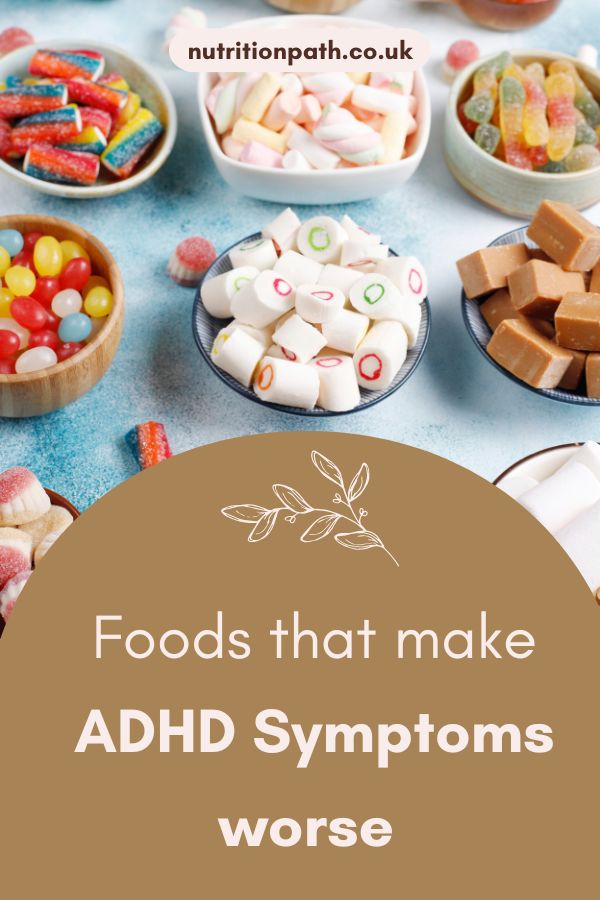
Key Nutrients That Support ADHD
Here you will find some of the essential nutrients that can help improve ADHD symptoms. Evidence shows that many of these can be low in ADHDers and my clinical experience also shows improvements in ADHD symptoms and energy when clients increase these nutrients with food and/ or supplements.
If you want to effortlessly add some of these into your diet and try out some convenient and easy breakfast or snacks, check out the dopamine-friendly smoothies here.
Should I use a supplement of these nutrients for ADHD?
If you struggle with ADHD symptoms, it could be tempting to simply get all of these nutrients as supplements and forget about it. But to do it well and effectively, it’s a little more complex than that.
The quality, quantity and the ingredients list of supplements matter, as many supermarket and low-cost brands may use additives and food dyes, which can affect ADHD symptoms. Also, using some nutrients consistently without doing tests or checking levels can lead to depletion of other nutrients.
👉 So instead of self-prescribing, it’s a really good idea to work with your doctor or nutritional therapist, who can help you choose supplements safely and check for any interactions for medication.
1. Protein – supports ADHD energy and helps reduce cravings
Many know that ADHD is linked to low dopamine, yet not everyone knows that dopamine is made from amino acid tyrosine, which can be found in food or made from amino acid phenylalanine. And that is exactly why protein is a crucial nutrient to consume daily for ADHDers – it contains the building blocks the ADHD brain needs for motivation, focus and executive function.
While research on ADHD and protein is still emerging, there are some promising signs. For example, studies in children with ADHD and higher protein and mineral consumption show fewer ADHD symptoms .
In non-ADHD adolescent girls, high-protein breakfasts helped to reduce cravings and boost markers linked to dopamine. This suggests that adding enough protein to the diet, especially earlier in the day, may help reduce cravings, help with focus and energy.
Although more recent ADHD research is on the way, experience from my ADHD nutritional clinic clients consistently shows that higher protein intake supports ADHD energy, focus and helps reduce sugar cravings.
While the majority of protein sources will contain tyrosine and phenylalanine, here are the sources that are much higher in these amino acids.
♦️ Animal food sources: chicken, beef, pork, turkey, tuna, salmon, cod, eggs, milk and yoghurt (especially cheese).
🌿 Plant-based food sources: soy beans, lentils, chickpeas, pumpkin seeds, sesame seeds, tahini, black beans, kidney beans, peanuts and peanut butter, quinoa, oats, almonds, spirulina.
Curious of the link between low protein and cravings? Check out my other blog here exploring low protein for ADHD and cravings.
2. Omega-3 Fatty Acids– promotes focus and brain health
One factor linked to ADHD is low grade inflammation in the brain (neuroinflammation) with elevated inflammatory markers like IL-6, which can affect focus, mood and behaviour.
Omega-3 is one of the most potent anti-inflammatory agents for the human body and it could support how neurotransmitters communicate, improving ADHD symptoms.
A meta-analysis of 1,997 children found that levels of omega-3 were low in ADHD and symptoms of hyperactivity and attention improved with omega-3 supplementation .
In contrast, another recent large meta analysis of 1,789 participants did not see a change in symptoms until 4 months of supplementation. Findings suggest that consistency in having omega-3 fatty acids is important.
While omega-3 is available both in animal sources and plant sources, it is generally much more bioavailable in animal form (fish and seafood), especially for women. However, due to high pollution of the seas, limiting oily fish intake to twice a week and getting a good quality fish oil supplement can be a good idea.
Check your suppliers and work with a nutritional therapist to help get the right supplements for you and check essential nutrient/ drug interactions.
♦️ Animal food sources: oily fish SMASHT (sardines, mackerel, anchovies, salmon, herring and trout), oysters, mussels, crab, lobster, fish oil, cod liver oil, krill oil, grass-fed beef and lamb (small amounts), grass-fed dairy (small amounts).
🌿 Plant-based food sources: flaxseed, chia seeds, hemp seeds, walnuts, algae oil.
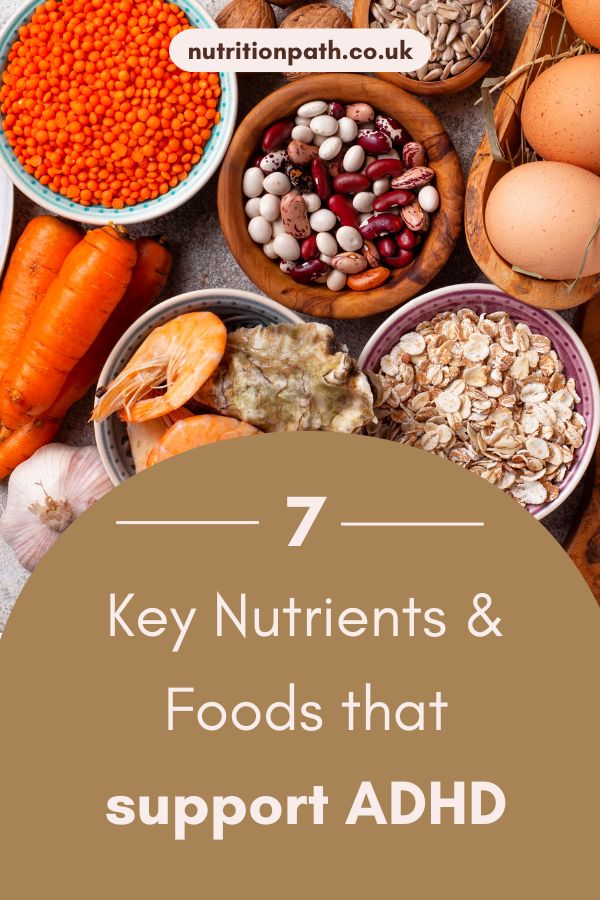
3. B Vitamins – energy, mood and stress resilience
B vitamins are also key to dopamine synthesis, as B6 is a cofactor to dopamine conversion, at several steps of the pathway. In addition, B vitamins are also key in the conversion of other neurotransmitters, such as dopamine and norepinephrine, which can influence mood and focus further.
Disturbances in the biochemical process methylation, which requires folate (vitamin B9) and vitamin B12, are linked to mental health issues, as well as ADHD symptoms. One systematic review included studies with 982 children found that ADHD children had much lower B9 and B12 levels .
ADHDers also tend to have higher stress reactivity and B vitamins, such as B5, B6 and B12 support the adrenal gland and help improve stress resilience.
♦️ Animal food sources: meat, fish, poultry, eggs, dairy.
🌿 Plant-based food sources: Leafy greens (spinach, kale), avocado, bananas, oats, chickpeas, walnuts, seeds and nuts, beans and pulses, quinoa, sweet potato, asparagus.
4. Magnesium– calm for the nervous system
Magnesium is part of around 300 enzymatic functions in the body and one of those functions is involved in calming the nervous system and supporting dopamine receptor sensitivity.
Therefore magnesium can help improve irritability, poor focus and restlessness, as well as increase calm and energy. Magnesium is often low even in the general population, considering our hectic lifestyles and reduced nutrient quality due to farming practices over the years. While ADHDers often display sensitive nervous systems and low grade chronic inflammation in the brain, getting enough magnesium is crucial to support stress resilience.
Magnesium intake is generally highest in plant-based food sources, however small amounts can be found in animal sources.
♦️ Animal food sources: fish (salmon, halibut, tuna, mackerel), chicken, beef, milk & yoghurt.
🌿Plant-based food sources: Pumpkin seeds, chia seeds, nuts (almonds, cashews, peanuts), spinach, black beans, edamame, quinoa.
5. Zinc – dopamine receptor sensitivity and impulse control
Zinc is essential in supporting dopamine production and regulation in the brain. Yet, according to a meta-analysis of 2,480 participants, zinc is one of the most common nutrient deficiencies seen in ADHDers.
Correcting zinc deficiency can be key in ADHD , as when taken alongside medications like methylphenidate it improved the effectiveness of the medication in a double blind and randomized trial of 44 children.
♦️ Animal food sources: oysters (highest natural source available), beef, lamb, pork, turkey.
🌿 Plant-based food sources: pumpkin seeds, hemp seeds, cashews.
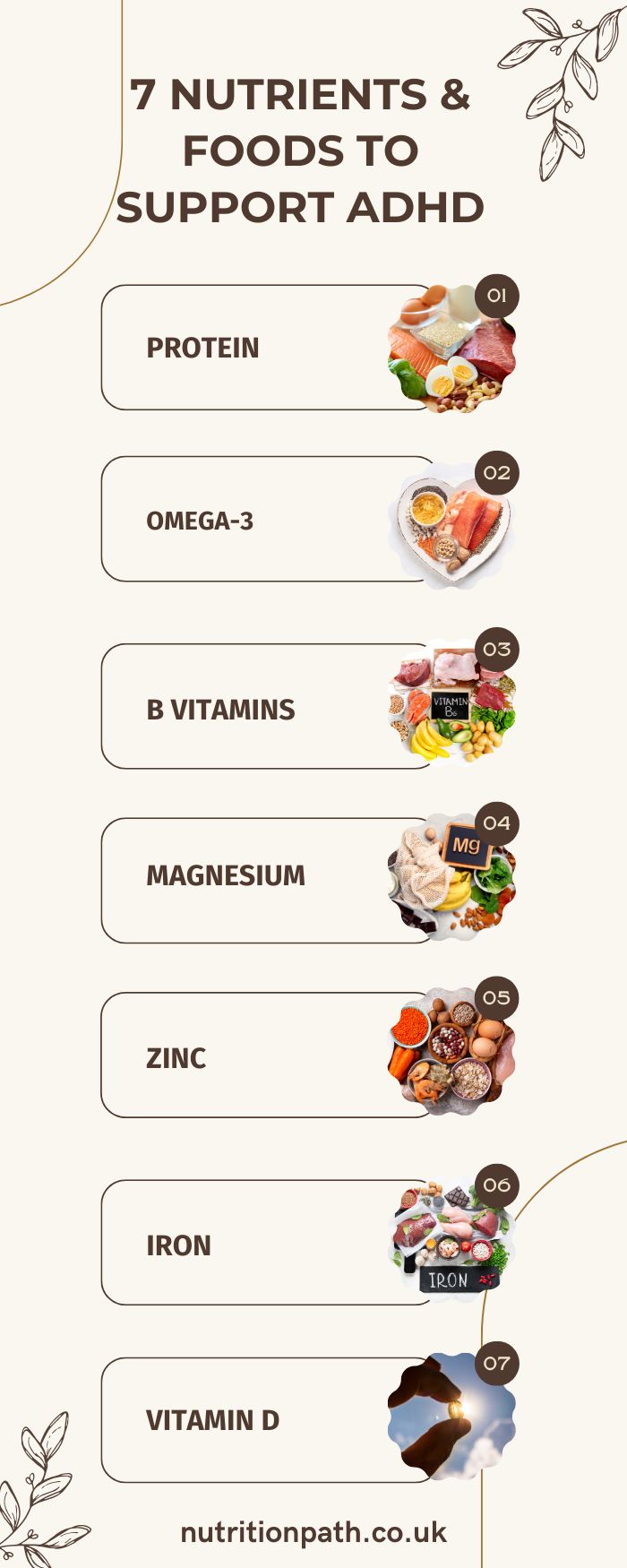
6. Iron – dopamine production
Similar to zinc, iron is another very common nutritional deficiency seen in ADHDers. An important cofactor to tyrosine hydroxylase, an enzyme that helps convert tyrosine → L-DOPA → dopamine. Needless to say, iron is key in improving focus, mood and motivation.
Be cautious when testing for iron, as you can see normal iron or hemoglobin in the tests/ labs, while ferritin (iron stores) may be low. Additionally, ferritin may be within the accepted range, yet towards the lower end of it. Often these ranges are set for the general population and in my nutritional clinic many people, especially with ADHD, may feel increased symptoms even within the accepted low range.
Iron is generally better absorbed in its heme form (animal sources), rather than non-heme form (plant-based sources). Iron absorption can be improved by consuming it with vitamin C and having it separately from tannins from tea and coffee, and calcium in lots of dairy.
♦️ Animal food sources: liver, red meat (beef, lamb, venison and game), poultry, fish, egg yolks.
🌿 Plant-based food sources: beans (kidney, black, navy and soy), pulses (lentils, chickpeas), green leafy veg (spinach, kale, collard greens, Swiss chard), seeds (pumpkin, sesame, sunflower, hemp, flax), nNuts (cashews, almonds, pine nuts), whole grains (quinoa, oats, fortified cereals, brown rice).
7. Vitamin D – brain health and mood support
Vitamin D is one of the often overlooked nutrients for improving ADHD symptoms. Now generally more recognised as essential to our moods, vitamin D is linked to better synaptic function supporting neurotransmitters dopamine and serotonin.
Indeed, a systematic review and meta-analysis found low vitamin D levels in people with ADHD in studies with 10,334 participants. Since deficiency is quite common, especially in the northern hemisphere, it’s worth testing levels in late autumn to consider adjustment.
In addition, vitamin D has anti-inflammatory properties that support the ADHD brain and help reduce the low-grade inflammation.
While vitamin D can help support mood and focus in ADHDers, food sources are generally low in vitamin D. So it’s important to spend time outdoors with arms and legs uncovered when possible (considering it’s safe) and soaking up those rays on the skin.
It’s a good idea to consider supplementation late autumn/ winter, depending on where you live, but make sure you consult a doctor or nutritional professional on the best nutrient forms and quantities for you.
♦️ Some vitamin D food sources (low): oily fish (salmon, mackerel, sardines), egg yolks, grass fed meat.
Bottom Line
Nutrition can support ADHD brain, especially when applied in combination with lifestyle changes and medication (where appropriate). Yet, since ADHDers often have several nutritional deficiencies, such as zinc and iron, increasing these foods and sometimes even supplementing can help improve energy, mood and focus with ADHD.
👉👉 It’s always a great idea to work with an experienced nutritional therapist or your GP to come up with a plan that works for your unique brain, considers your medication and lifestyle challenges.
FAQs About ADHD and Nutrition
-
What are the most important nutrients for ADHD?
Protein is key because it provides amino acids (tyrosine and phenylalanine) needed for dopamine production. Other important nutrients include B-vitamins, magnesium, iron, zinc, omega-3 fatty acids, and vitamin D — all essential for attention, mood, and cognitive function.
-
Can diet really improve ADHD symptoms?
Yes. Balanced nutrition can support ADHD by improving focus, energy, mood stability, and emotional regulation. Diet works best alongside lifestyle changes and, for some people, medication.
-
What foods are best for energy and focus in ADHD?
Focus-supporting foods include:
– Protein-rich meals: chicken, fish, eggs, beans, lentils
– Omega-3 sources: oily fish, flaxseed, chia seeds
– B-vitamin & magnesium sources: leafy greens, whole grains, nuts, seeds
Consistent intake (rather than perfection) makes the biggest impact. -
Which foods can make ADHD symptoms worse?
For some individuals, foods that may worsen symptoms include:
– highly processed foods
– high sugar and refined carbohydrates
– artificial additives and sweeteners
– excessive caffeine or stimulants.
These can destabilise blood sugar, leading to crashes in mood, energy, and attention. -
Do people with ADHD have nutritional deficiencies?
Yes — nutrient deficiencies are common. Research shows lower levels of zinc, iron, omega-3s, magnesium, and vitamin D in many individuals with ADHD compared to the general population.
References (further reading)
- Chang, J. P. C., Su, K. P., Mondelli, V., Pariante, C. M., & Wei, H. T. (2023). Omega-3 polyunsaturated fatty acids for core symptoms of attention-deficit/hyperactivity disorder: A meta-analysis of randomized controlled trials. Journal of Psychiatric Research, 163, 437–445. https://doi.org/10.1016/j.jpsychires.2023.07.008
- Wang, L. J., Yu, Y. H., Fu, M. L., Yeh, W. T., Hsu, J. L., Yang, Y. H., & Lee, S. Y. (2022). Peripheral blood inflammatory markers in patients with attention deficit/hyperactivity disorder (ADHD): A systematic review and meta-analysis. Brain, Behavior, and Immunity, 103, 153–164. https://doi.org/10.1016/j.bbi.2022.05.014
- Sonuga-Barke, E. J. S., Brandeis, D., Cortese, S., Daley, D., Ferrin, M., Holtmann, M., … Sergeant, J. (2013). Nonpharmacological interventions for ADHD: Systematic review and meta-analyses of randomized controlled trials of dietary and psychological treatments. American Journal of Psychiatry, 170(3), 275–289. https://doi.org/10.1176/appi.ajp.2012.12070991
- Bloch, M. H., & Qawasmi, A. (2011). Omega-3 fatty acid supplementation for the treatment of children with attention-deficit/hyperactivity disorder symptomatology: Systematic review and meta-analysis. Journal of the American Academy of Child & Adolescent Psychiatry, 50(10), 991–1000. https://doi.org/10.1016/j.jaac.2011.06.008
- Scassellati, C., Bonvicini, C., Faraone, S. V., & Gennarelli, M. (2012). Biomarkers and attention-deficit/hyperactivity disorder: A systematic review and meta-analyses. Journal of the American Academy of Child & Adolescent Psychiatry, 51(10), 1003–1019. https://doi.org/10.1016/j.jaac.2012.08.015
